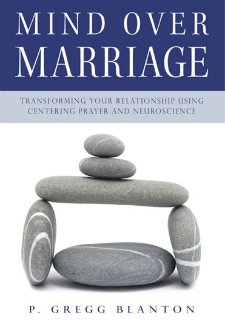Mind Over Marriage
Insightful and important book that brings together neuroscience and contemplation in a way to transform our marriages
 Mind Over Marriage
Mind Over Marriage
By P Gregg Blanton
New York: Lantern Books
ISBN 978-1-59056-375-5
Reviewer: Shaun Lambert
In his book Mind Over Marriage P. Gregg Blanton offers richer fare than most when it comes to answering the question, ‘How do I transform my marriage?’
There are many helpful insights that enable us to step out of the blame game that blights so many marriages. Although we often automatically blame our partners for the sickness in our marriages, and are poorer for it, health comes from realising that the real culprit for our unhappiness ‘lies as close as our own mind.’ The influence of our minds extends into our marriages for worse, but with the right training also for the better.
Professor Blanton is a trained marital and family therapist, as well as theologian and contemplative. Through integrating the complementary insights of neuroscience and Christian contemplation he outlines the way to health in our marital relationships.
One of the things that keeps our relationships in sickness is that most of us don’t understand how our minds work. So the first fundamental principle of the book is that changing our mind for the better, living out of fullness, begins with fully understanding that mind, and how it flows into our relationships.
The key player in taking us out of a healthy place is the threat-based system of our mind, operating behind the scenes, that pushed by fear leads us into chaos or rigidity, experienced as blame, attack or closing down. But how do we make a ‘mental shift from fear to one of love?’
The second, surprising, but extremely well-researched fundamental principle is that that change is achieved through contemplative practice. Contemplative practice can alter the structure and activity of the brain for the better, as well as strengthen our relationships. As the author puts it, ‘contemplative practice is a learnable skill that can alter the way the mind functions.’
The writer draws from the rich contemplative tradition within Christianity but teaches in particular a modern form of contemplation called the Centering Prayer. In Centering Prayer we consent to God’s presence and action within. Blanton believes that the positive research findings about mindfulness as a contemplative practice can be applied to Centering Prayer.
In his work as a marriage counsellor the author is moving couples to marital well-being by helping them develop the positive traits that transform a marriage, through a regular practice of contemplative prayer. This is the third fundamental principle outlined in the book.
In this third section he outlines six traits that come out of regular contemplative prayer, that bring wellbeing into marriage. These are relational embodied traits.
It works like this: the contemplative skill of stillness becomes the trait of calmness; the contemplative skill of letting go becomes the trait of attunement; the contemplative skill of openness becomes the trait of presence; the contemplative skill of paying attention leads to the trait of stories of truth; the contemplative state of union with God leads to the trait of resonance; and finally the contemplative experience of the love of God helps us develop the trait of being trustworthy.
The traits of presence, attunement, resonance and truth are also advocated in interpersonal neurobiology. Presence is defined as the difficult skill of being fully present in the moment, attunement is about how you respond to your spouse’s emotions (many of us are emotion-dismissing which is unhelpful), resonance is where me becomes ‘we,’ where two feel one and connected, and trust is the glue that holds our relationships together and moves us from fear to love.
The book is beautifully written and clearly laid out, with the integration between neuroscience and contemplation clearly attuned to each other. Its insights, can, I believe, be applied to all relationships. I am encouraging everyone I know to read it!
P. Gregg Blanton is a professor of Psychology and Human Services at Montreat College and an adjunct professor at Gordon-Conwell Theological Seminary. He is also a licenced marriage and family therapist. You can learn more about the author and his writing via his website http://greggblanton.homestead.com/.
Shaun Lambert is a trained counsellor and psychotherapist, and Senior Minister of Stanmore Baptist Church
Baptist Times, 11/12/2014